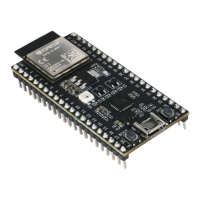Chapter 2. API Reference
the array will then be used as the task’s stack, removing the need for the stack to be allocated
dynamically.
• pxTaskBuffer: Must point to a variable of type StaticTask_t, which will then be used to hold
the task’s data structures, removing the need for the memory to be allocated dynamically.
• xCoreID: If the value is tskNO_AFFINITY, the created task is not pinned to any CPU, and the
scheduler can run it on any core available. Values 0 or 1 indicate the index number of the CPU
which the task should be pinned to. Specifying values larger than (portNUM_PROCESSORS - 1)
will cause the function to fail.
static TaskHandle_t xTaskCreateStatic(TaskFunction_t pvTaskCode, const char *const pc-
Name, const uint32_t ulStackDepth, void *const
pvParameters, UBaseType_t uxPriority, StackType_t
*const puxStackBuffer, StaticTask_t *const px-
TaskBuffer)
Create a new task and add it to the list of tasks that are ready to run.
Internally, within the FreeRTOS implementation, tasks use two blocks of memory. The first block is used to
hold the task’s data structures. The second block is used by the task as its stack. If a task is created using
xTaskCreate() then both blocks of memory are automatically dynamically allocated inside the xTaskCreate()
function. (see http://www.freertos.org/a00111.html). If a task is created using xTaskCreateStatic() then the
application writer must provide the required memory. xTaskCreateStatic() therefore allows a task to be created
without using any dynamic memory allocation.
Example usage:
// Dimensions the buffer that the task being created will use as its stack.
// NOTE: This is the number of bytes the stack will hold, not the number of
// words as found in vanilla FreeRTOS.
#define STACK_SIZE 200
// Structure that will hold the TCB of the task being created.
StaticTask_t xTaskBuffer;
// Buffer that the task being created will use as its stack. Note this is
// an array of StackType_t variables. The size of StackType_t is dependent on
// the RTOS port.
StackType_t xStack[ STACK_SIZE ];
// Function that implements the task being created.
void vTaskCode( void * pvParameters )
{
// The parameter value is expected to be 1 as 1 is passed in the
// pvParameters value in the call to xTaskCreateStatic().
configASSERT( ( uint32_t ) pvParameters == 1UL );
for( ;; )
{
// Task code goes here.
}
}
// Function that creates a task.
void vOtherFunction( void )
{
TaskHandle_t xHandle = NULL;
// Create the task without using any dynamic memory allocation.
xHandle = xTaskCreateStatic(
vTaskCode, // Function that implements the task.
"NAME", // Text name for the task.
STACK_SIZE, // Stack size in bytes, not words.
( void * ) 1, // Parameter passed into the task.
(continues on next page)
Espressif Systems 854
Submit Document Feedback
Release v4.4

